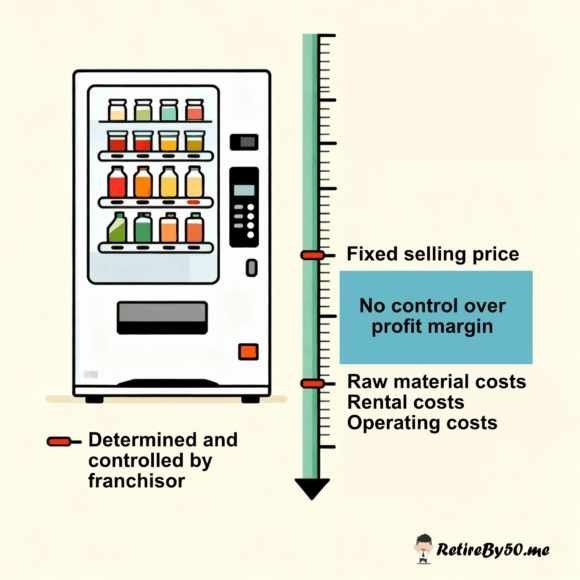Should You Invest in a Fruit Juice Vending Machine Franchise?
Recently, I was at Franchising and Licensing Asia (FLA) 2025 to help out my friends at The Financial Coconut who were running their live-streaming booth at the event. Among the numerous business models showcased, fruit vending machine franchises stood out due to the rising interest in automated retail and healthier beverage options. Given the growing trend, I felt compelled to dig deeper and understand what it truly means to invest in such a franchise.
This article is about my insights from the event, highlighting both the appealing aspects and hidden challenges of fruit vending machine franchises. My hope is that this will assist others who are weighing similar business decisions.
Every week, I’ll be sharing practical tips and invaluable knowledge to guide you on your path to financial independence.
Benefits of Investing in a Fruit Juice Vending Machine Franchise
One of the major draws of franchising is the turnkey business concept it offers. For an investment typically around $25,000 to $30,000, franchisees gain access to a fully equipped robotic juicer vending machine, system infrastructure, branding elements, operational training, and integrated cashless payment systems. This approach allows business owners to skip many initial startup hurdles and hit the ground running. Many franchisors sweeten the deal by waiving licensing and royalty fees during the first three years, softening the barrier to entry and making the initial payback period potentially attractive.
Moreover, franchisees benefit from the franchisor’s established brand equity, centralised supply chains, and marketing efforts. This often translates into less guesswork and fewer operational headaches than going at it alone. For investors who prefer a structured approach backed by robust support, franchising presents a viable path to entry into automated retail.
Realistic Financial Insights: Costs, Pricing, and ROI of Juice Vending Franchises
While the franchise brochures and pitches are very attractive, it is critical to examine the assumptions behind their financial projections. One of the franchisors marketed that the average selling price for each cup of their juices is $2.80, which strikes me as somewhat aggressive. In markets like Singapore, competitors such as iJooz offer juices at about $2. This difference may sound small but can have a significant impact on customer demand and overall sales volume. In turn, it impacts your net profit as a franchisee.
Additionally, many franchisors estimate rental and utility costs at roughly $300 per month. In reality, prime commercial locations with substantial foot traffic command much higher rents. The lower rental costs implied likely correspond to less desirable or industrial-type locations, where sales can be challenging. When you realistically adjust prices and rent costs, many franchisees will find their ROI timelines extended and profit margins compressed beyond what initial sales materials suggest.
The Importance of Transparency on Fees and Hidden Costs
Another crucial insight I gained at FLA 2025 is the paramount importance of understanding all fees before committing to a franchise. Marketing materials typically emphasise waived royalty fees or attractive startup packages but often do not give a full picture of ongoing expenses. These can include monthly system subscription fees, charges for extended warranties, contributions to marketing funds, and the introduction of royalty or licensing fees once initial waiver periods expire.
Lack of transparency in these fees can erode profitability significantly over time. When one of my friends probed deeper into various operational aspects of the franchise, he was informed by the sales representative that there will be additional costs that were not mentioned in the marketing brochure. Prospective franchisees should insist on detailed fee breakdowns and written commitments to avoid unpleasant surprises. Accurate and full disclosure is vital for trustworthy financial modelling and to truly understand the business’s long-term financial picture.
Key Limitations of Fruit Vending Machine Franchising You Must Know
Beyond the financial considerations, franchisees face important operational constraints. Franchise agreements typically require sales of franchisor-approved fruit juices at fixed prices, limiting responsiveness to local customer preferences or competitive pressures. This lack of product and pricing flexibility can stall the ability to innovate or shift strategy. Essentially, your upside is capped by the selling price determined by the franchisor because they get to set the selling price of the beverage.
Furthermore, your downside isn’t always protected because franchisors would usually retain the right to increase raw material, licensing, or royalty fees after introductory periods end. Franchisees typically have no say in these increases yet must absorb the higher costs, reducing profitability.
Perhaps most crucially, franchisees do not always own the vending machines outright. Instead, they pay a premium for equipment that cannot easily be taken outside the franchise or resold independently. This limits possible exit options and exposes investors to potential losses on their invested capital if they decide to leave or switch business models.
Is a Juice Vending Machine Franchise Right for Your Business Goals?
Franchising is best suited to those who appreciate structure, brand recognition, and external support and who can tolerate capped returns and limited flexibility. It aligns well with investors seeking a lower-risk, easier entry into automated retail backed by systems to streamline operations.
On the other hand, entrepreneurs who want control over pricing, products, and operational decisions may find franchising too restrictive. Business models imposing such limits require clear alignment with one’s long-term vision and willingness to trade autonomy for convenience.
Risks and Hidden Costs of Juice Vending Machine Franchise Investments
Several risks merit close attention. Location is critical; a poor site choice reduces sales volume, and fixed costs like rent may escalate unexpectedly. The lack of machine ownership and limited exit pathways increase financial exposure and can complicate business transitions.
Taken together, these risks mean franchisees face limited profit growth opportunities and significant downside exposure. Conservative assumptions and thorough planning are necessary to mitigate these challenges.
The Importance of Due Diligence Before Buying a Vending Machine Franchise
Due diligence is indispensable. Contract review must cover all fees, rights, and obligations comprehensively. Financial models should consider a range of outcomes with conservative sales and cost estimates. Real-world site assessments are essential to validate expected foot traffic and sales.
Seeking legal and financial advice can identify hidden clauses or risks, empowering investors to negotiate better terms or walk away if conditions are unfavorable.
Alternative Options: Independent Juice Vending Machine Ownership vs Franchise
Alternatively, some entrepreneurs opt to purchase vending machines outright. Though this path demands more operational effort, supply chain management, and marketing initiatives, it confers full asset ownership and pricing flexibility.
Independent operators can innovate faster, respond to market trends, and maintain control over their exit strategies. For those comfortable with these responsibilities, it offers a chance for greater long-term upside and autonomy.
Why I Personally Would Not Invest in Fruit Vending Machine Franchises
After weighing the various aspects, I must share that I would not personally invest in fruit vending machine franchises where control over pricing, product mix, and costs is limited. The inability to innovate and pivot combined with the franchisor’s ability to increase fees threatens profitability. Moreover, not owning the equipment diminishes exit flexibility and value recovery.
For me, business ownership means steering the ship independently, making proactive decisions to overcome challenges and capitalise on opportunities. That is why my preference lies with independent business models where I retain full operational and financial control.
Final Verdict: Making an Informed Decision on Fruit Vending Machine Franchises
In conclusion, fruit vending machine franchising provides convenience and structural support but comes with substantial limits on flexibility and control, alongside potential hidden costs and risks. Your decision should hinge on your appetite for risk, desire for autonomy, and alignment with your business goals.
If you pursue franchising, conduct thorough due diligence, prepare conservative financial plans, and ensure clear contractual understanding. Attending industry events like FLA 2025 can provide invaluable insight and access to credible franchise partners.
Smart business ownership involves understanding trade-offs clearly and choosing models that best match your priorities and capabilities.


